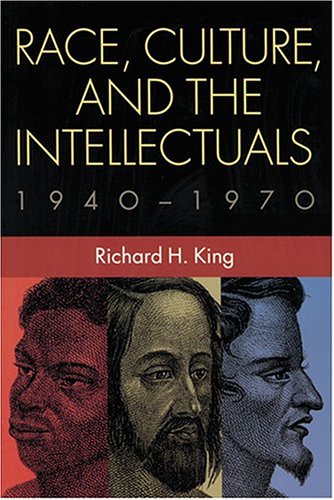
Title

Race, Culture, and the Intellectuals, 19401970 (Woodrow Wilson Center Press),Used
Delivery time: 8-12 business days (International)
Toward the end of World War II, scholars and writers reeling from the politics of racism stressed the unity of humankind, but by the early 1970s, dominant voices proclaimed ongoing diversity sometimes irreconcilable antagonism among human cultures. To study this transition from universalism to cultural particularism, Richard King focuses on the arguments of major thinkers, movements, and traditions of thought, attempting to construct a map of the ideological positions that were staked out and an intellectual history of this transition.King's range is international, from North American and European concerns, to the Negritude movement of Africa and the Caribbean, to arguments raised at the 1955 Bandung Conference in Indonesia. And his comparisons embrace a diversity of subjects, such as antiSemitism and antiblack racism, and political, psychological, and sociological models of oppression, accommodation, and resistance. This study explores the intellectual roots of current debates over such topics as affirmative action, multiculturalism, cultural relativism, and humanism. Among thinkers who receive sustained attention are Theodor Adorno, Hannah Arendt, James Baldwin, Amiri Baraka, Bruno Bettelheim, Harold Cruse, Stanley Elkins, Ralph Ellison, Frantz Fanon, E. Franklin Frazier, Raul Hilberg, Max Horkheimer, C. L. R. James, Albert Memmi, Albert Murray, Gunnar Myrdal, JeanPaul Sartre, and Richard Wright.
By changing our most important processes and
products, we have already made a big leap forward. This ranges from the
increased use of more sustainable fibers to the use of more
environmentally friendly printing processes to the development of
efficient waste management in our value chain.
⚠️ WARNING (California Proposition 65):
This product may contain chemicals known to the State of California to cause cancer, birth defects, or other reproductive harm.
For more information, please visit www.P65Warnings.ca.gov.
Shipping & Returns
Shipping
We ship your order within 2–3 business days for USA deliveries and 5–8 business days for international shipments. Once your package has been dispatched from our warehouse, you'll receive an email confirmation with a tracking number, allowing you to track the status of your delivery.
Returns
To facilitate a smooth return process, a Return Authorization (RA) Number is required for all returns. Returns without a valid RA number will be declined and may incur additional fees. You can request an RA number within 15 days of the original delivery date. For more details, please refer to our Return & Refund Policy page.
Shipping & Returns
Shipping
We ship your order within 2–3 business days for USA deliveries and 5–8 business days for international shipments. Once your package has been dispatched from our warehouse, you'll receive an email confirmation with a tracking number, allowing you to track the status of your delivery.
Returns
To facilitate a smooth return process, a Return Authorization (RA) Number is required for all returns. Returns without a valid RA number will be declined and may incur additional fees. You can request an RA number within 15 days of the original delivery date. For more details, please refer to our Return & Refund Policy page.
Warranty
We provide a 2-year limited warranty, from the date of purchase for all our products.
If you believe you have received a defective product, or are experiencing any problems with your product, please contact us.
This warranty strictly does not cover damages that arose from negligence, misuse, wear and tear, or not in accordance with product instructions (dropping the product, etc.).
Warranty
We provide a 2-year limited warranty, from the date of purchase for all our products.
If you believe you have received a defective product, or are experiencing any problems with your product, please contact us.
This warranty strictly does not cover damages that arose from negligence, misuse, wear and tear, or not in accordance with product instructions (dropping the product, etc.).
Secure Payment
Your payment information is processed securely. We do not store credit card details nor have access to your credit card information.
We accept payments with :
Visa, MasterCard, American Express, Paypal, Shopify Payments, Shop Pay and more.
Secure Payment
Your payment information is processed securely. We do not store credit card details nor have access to your credit card information.
We accept payments with :
Visa, MasterCard, American Express, Paypal, Shopify Payments, Shop Pay and more.
Related Products
You may also like
Frequently Asked Questions
- Q: What is the main theme of 'Race, Culture, and the Intellectuals, 1940--1970'? A: The book explores the transition from universalism to cultural particularism in the context of race and culture, examining how scholars and thinkers shifted their views regarding diversity and unity among human cultures.
- Q: Who is the author of this book? A: The book is authored by Professor Richard H. King.
- Q: What topics does the book cover? A: The book covers a range of topics including anti-Semitism, anti-black racism, affirmative action, multiculturalism, cultural relativism, and humanism, as well as major thinkers and movements from various cultures.
- Q: What is the condition of the used book? A: The book is listed as 'Used Book in Good Condition'.
- Q: When was this book published? A: The book was published on September 20, 2004.
- Q: How many pages does the book have? A: The book consists of 416 pages.
- Q: What is the binding type of the book? A: The book is available in hardcover.
- Q: Can you provide examples of thinkers discussed in the book? A: Yes, the book discusses several influential thinkers including Theodor Adorno, Hannah Arendt, James Baldwin, Amiri Baraka, and Richard Wright, among others.
- Q: What category does this book fall under? A: The book is categorized under 'Criticism & Theory'.
- Q: Is there any specific movement or conference highlighted in the book? A: Yes, the Negritude movement and the 1955 Bandung Conference in Indonesia are specifically highlighted in the text.
